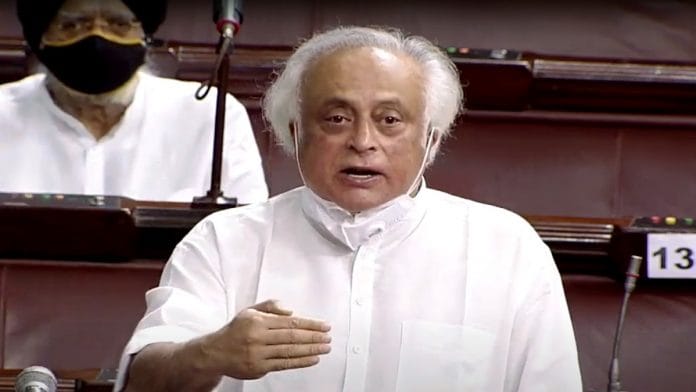New Delhi: Rajya Sabha member Jairam Ramesh has written to Speaker Om Birla opposing the manner in which amendments to the Biological Diversity Act — a law that seeks to protect India’s biodiversity — were tabled in Parliament Thursday.
The amendments were introduced with no discussion Thursday, and referred to a select committee instead of the Standing Committee on Science and Technology, Environment, Forests and Climate Change, which Ramesh chairs.
“The subject matter of the Bill and indeed the Biological Diversity Act, 2002, which sought to be amended, belongs fairly and squarely to the Ministry of Environment, Forests and Climate Change, and consequently to the standing committee related to it,” wrote Ramesh.
“I do not wish to say more on the motivations of the government to bypass the standing committee concerned and refer the contentious Bill to a select committee. The motivations are obvious,” he further wrote in the letter.
Ramesh called the move a “deliberate insult to the standing committee”.
The ‘select committee’ is a temporary panel as opposed to the ‘standing committee’, which is a parliamentary panel that is permanent in nature and functional through the year, reviewing the functioning of the ministry concerned.
“The chairperson of the standing committee has raised significant points related to parliamentary procedure which will be important for the ministry to respond,” said Kanchi Kohli, legal researcher at the Centre for Policy Research.
“However, equally important is to recognise that a substantive change to a law governing India’s biodiversity needs both popular and parliamentary debate. This certainly includes benefitting from the review of a parliamentary committee especially designed for oversight on science, technology and environment, which are core to the framework of the biodiversity Act which is being altered,” she added.
Also Read: Top 3 global risks now are climate action failure, biodiversity loss, infectious diseases
The amendments
The amendments include reducing pressure on wild medicinal plants by encouraging their cultivation to “encourage Indian system of medicine”, fast-tracking of research and patent applications, and bringing in more foreign investments to “the chain of biological resources”.
They also include decriminalisation of violations under the Act, which in their current form are non-bailable and can lead to imprisonment.
In the statement of objects and reasons, Environment Minister Bhupender Yadav said the amendments were being proposed after “concerns” were raised by stakeholders in the seed, industry and research sectors, as well as Indian medicine practitioners, who urged the government “to simplify, streamline, and reduce compliance burden” with the Act in its current form.
However, experts say some of these amendments will work to “dilute” the spirit of the Act, which was introduced to protect and conserve the country’s biodiversity.
What is the Biological Diversity Act
The Biological Diversity Act, 2002, was introduced after India became a signatory to the United Nations Convention on Biological Diversity (CBD) in 1993. The purpose of the convention was three-fold — conservation of biological diversity, sustainable use of the components of biological diversity, and fair and equitable sharing of the benefits arising out of the use of genetic resources.
The Act is India’s corresponding domestic law safeguarding these interests.
In 2014, an amendment to the global CBD, called the ‘Nagoya Protocol’, provided a legal framework for implementation of the third objective under the CBD, which member states are to comply with.
According to the Act in its current form, companies must enter into an ABS (access-benefits sharing) agreement with the communities whose resources are being used (referred to as ‘benefit claimers’ in the law), so that the benefits from its commercialisation are shared equitably.
Experts say
Shalini Bhutani, legal researcher and policy analyst working on biodiversity in the Asian region, said, “In the Indian context, the seed, pharma and AYUSH sectors have been resisting the approval procedures and legal obligation to pay for sharing access to benefits from utilisation of biological resources. They argue that since they’re already paying tax, they should not have to comply with this also, because it costs them time and money.”
“These amendments have been introduced to appease the industry, which has been making representations. The voices of local people and communities whose resources are being accessed or used for commercialisation are not included in these amendments,” she added.
“For instance, if the Nagoya Protocol is to be implemented in true spirit, then full prior informed consent (FPIC) of the local people must be institutionalised by the law and its implementing rules,” she further said.
Legal Initiative For Environment (LIFE) put out a statement saying that the amendments excluded cultivated medicinal plants from the Act’s purview, making it “impossible” to detect which plants are from the wild and which are cultivated, which could again harm the idea of equitable access to benefits.
“Biological resources coming from forests will be shown as cultivated in the areas owned or leased by companies. About 85 per cent of the raw material still comes from the forests. Therefore excluding medicinal plants under the cover of cultivation will adversely affect the benefits that would accrue to the communities and also threaten conservation,” read the statement.
Debadityo Sinha, senior resident fellow at the Vidhi Centre for Legal Policy, said that the original Act had a provision for the protection of biological habitats by ‘biological management committees’ (BMCs) — local bodies formed under the Act — which has been done away with.
“Section 41 of the Act says the BMCs must preserve biological habitats. But in the new amendment, this part of the section has been dropped. This was a strong provision, which has now been removed,” he said.
(Edited by Gitanjali Das)
Also Read: ‘Misappropriation’ of funds, lack of transparency in environment ministry schemes: MPs’ panel






